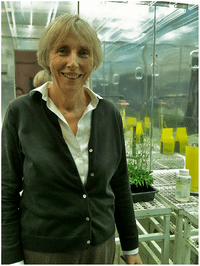Caroline Dean
| Caroline Dean | |
|---|---|
 | |
| Born | 2 April 1957[1] |
| Fields | |
| Institutions | |
| Alma mater | University of York (BSc, DPhil)[2] |
| Thesis | Investigations of genome expression in young wheat leaves (1983) |
| Doctoral students |
|
| Known for |
|
| Notable awards |
|
| Spouse | Jonathan D. G. Jones (m. 1991)[1] |
| Children | one son, one daughter[1][7] |
|
Website www | |
Professor Caroline Dean OBE, FRS[5] is a British plant scientist working at the John Innes Centre on the molecular control of timing of flowering in plants.[8][9][10][11][12][13][14][15]
Education
Dean was educated at the University of York, where she was awarded a Bachelor of Arts degree in Biology in 1978 and a DPhil[2] in 1982.[4][16]
Research
Dean's research has been funded by the Biotechnology and Biological Sciences Research Council[17] and focuses on:
"the timing of the transition to reproductive development in plants. The acceleration of flowering by prolonged cold is a classic epigenetic process called vernalization. The study of this and parallel genetic pathways has led us into the dissection of conserved chromatin silencing mechanisms involving non-coding RNAs.Our recent work has focused on a mechanistic understanding of vernalization and on the pathways that determine a requirement for vernalization. These pathways converge on a gene that encodes a floral repressor called FLC. We analyse how these pathways intersect during development, in different environmental conditions, and through evolution. This takes us into the analysis of what regulates reproductive strategy in plants. We use Arabidopsis as a reference to establish the regulatory hierarchy and then translate our findings into other species."[16]
Awards
In 2004 Dean became an Officer of the Order of the British Empire and a Fellow of the Royal Society. In 2008 the United States National Academy of Sciences elected her a foreign fellow. Her nomination for the Royal Society reads:
| “ | Dean has made outstanding contributions in the study of developmental timing in plants. Her work has revealed the mechanism by which plants remember they have experienced winter, demonstrated novel RNA processing mechanisms controlling flowering and determined the molecular basis of natural variation in Arabidopsis flowering time. Her discoveries have broad significance in the fields of epigenetics, post-transcriptional regulation and molecular evolution. Dean has also made a massive contribution to the development of Arabidopsis as a model, establishing resources for genetic mapping and insertional mutagenesis, and providing physical maps that underpinned the sequencing of the genome.[5] | ” |
Personal life
Dean is married to Jonathan D. G. Jones and has one son and one daughter.[1][7]
References
- 1 2 3 4 DEAN, Caroline. Who's Who 2015 (online Oxford University Press ed.). A & C Black, an imprint of Bloomsbury Publishing plc. (subscription required)
- 1 2 Dean, Caroline (1983). Investigations of genome expression in young wheat leaves (PhD thesis). University of York.
- ↑ Meinke, D. W.; Cherry, J. M.; Dean, C.; Rounsley, S. D.; Koornneef, M. (1998). "Arabidopsis thaliana: A Model Plant for Genome Analysis". Science 282 (5389): 662, 679–82. Bibcode:1998Sci...282..662M. doi:10.1126/science.282.5389.662. PMID 9784120.
- 1 2 Bastow, R.; Mylne, J. S.; Lister, C.; Lippman, Z.; Martienssen, R. A.; Dean, C. (2004). "Vernalization requires epigenetic silencing of FLC by histone methylation". Nature 427 (6970): 164–167. Bibcode:2004Natur.427..164B. doi:10.1038/nature02269. PMID 14712277.
- 1 2 3 "EC/2004/15: Dean, Caroline". London: The Royal Society. Archived from the original on 2015-02-02.
- ↑ "John Innes Centre scientist receives top international honour". John Innes Centre. 2008. Archived from the original on 2011-05-15.
- 1 2 Dean, Caroline; Osborn, Mary; Oshlack, Alicia; Thornton, Janet (2012). "Women in science". Genome Biology 13 (3): 148. doi:10.1186/gb4005. PMC 3439960. PMID 22405408.
- ↑ Gitschier, J. (2013). "How Cool is That: An Interview with Caroline Dean". PLoS Genetics 9 (6): e1003593. doi:10.1371/journal.pgen.1003593. PMC 3694836. PMID 23825965.
- ↑ Vaeck, M.; Reynaerts, A.; Höfte, H.; Jansens, S.; De Beuckeleer, M.; Dean, C.; Zabeau, M.; Montagu, M. V.; Leemans, J. (1987). "Transgenic plants protected from insect attack". Nature 328 (6125): 33–37. Bibcode:1987Natur.328...33V. doi:10.1038/328033a0.
- ↑ Simpson, G. G.; Dean, C. (2002). "Arabidopsis, the Rosetta Stone of Flowering Time?". Science 296 (5566): 285–289. Bibcode:2002Sci...296..285S. doi:10.1126/science.296.5566.285. PMID 11951029.
- ↑ Caroline Dean's publications indexed by the Scopus bibliographic database, a service provided by Elsevier.
- ↑ Sundaresan, V.; Springer, P.; Volpe, T.; Haward, S.; Jones, J. D.; Dean, C.; Ma, H.; Martienssen, R. (1995). "Patterns of gene action in plant development revealed by enhancer trap and gene trap transposable elements". Genes & Development 9 (14): 1797–1810. doi:10.1101/gad.9.14.1797. PMID 7622040.
- ↑ Johanson, U.; West, J.; Lister, C.; Michaels, S.; Amasino, R.; Dean, C. (2000). "Molecular Analysis of FRIGIDA, a Major Determinant of Natural Variation in Arabidopsis Flowering Time". Science 290 (5490): 344–347. Bibcode:2000Sci...290..344J. doi:10.1126/science.290.5490.344. PMID 11030654.
- ↑ Lister, C.; Dean, C. (1993). "Recombinant inbred lines for mapping RFLP and phenotypic markers in Arabidopsis thaliana". The Plant Journal 4 (4): 745–750. doi:10.1046/j.1365-313X.1993.04040745.x.
- ↑ List of publications from Microsoft Academic Search
- 1 2 "Caroline Dean, Cell & Developmental Biology". Archived from the original on 2013-07-14.
- ↑ "UK Government Grants awarded to Caroline Dean"., via Research Councils UK